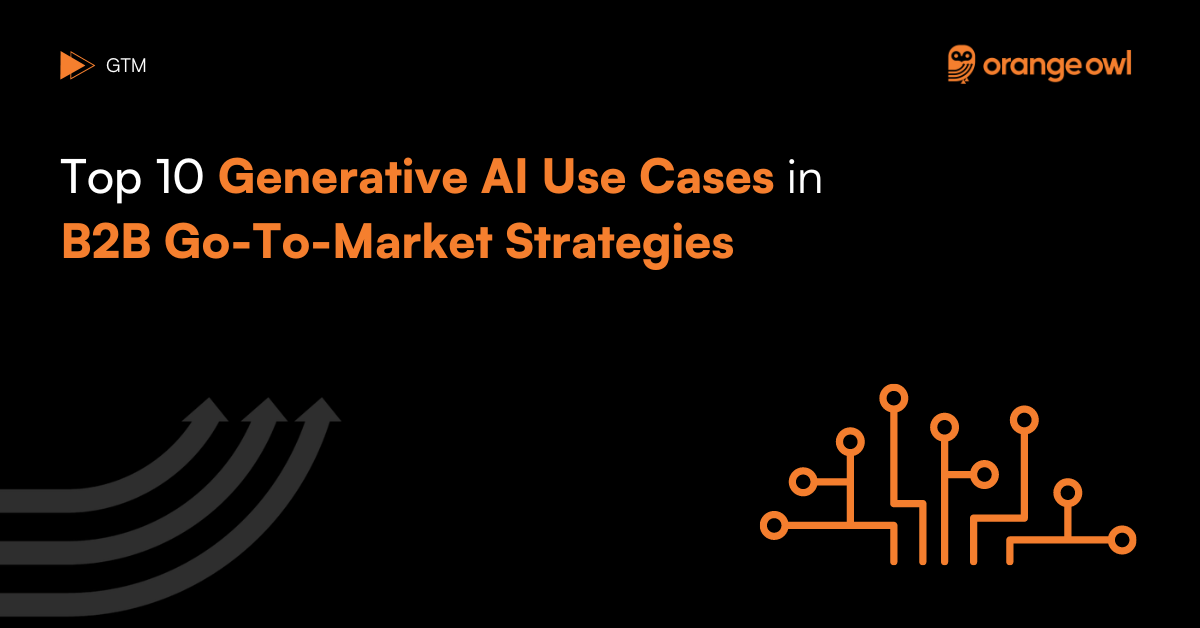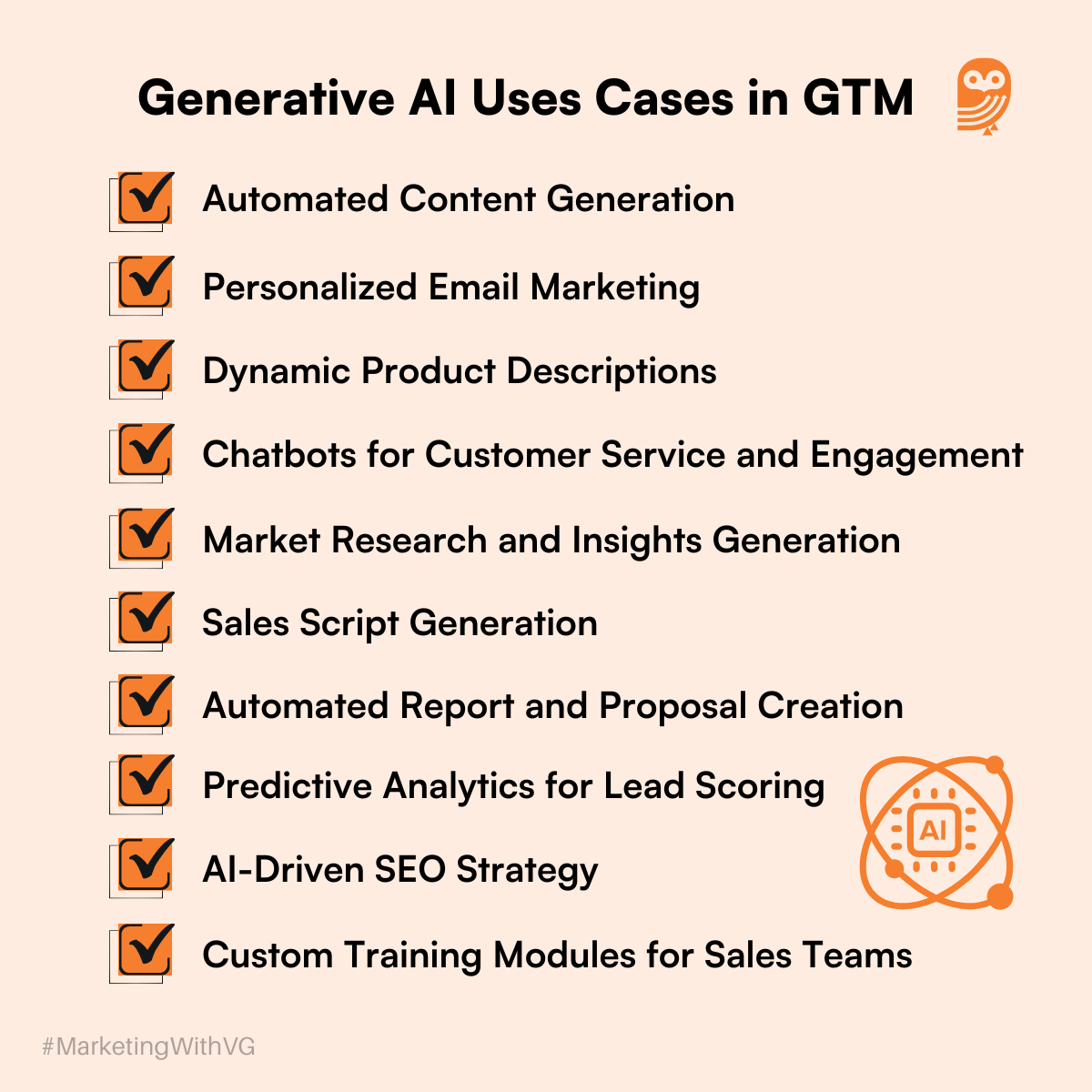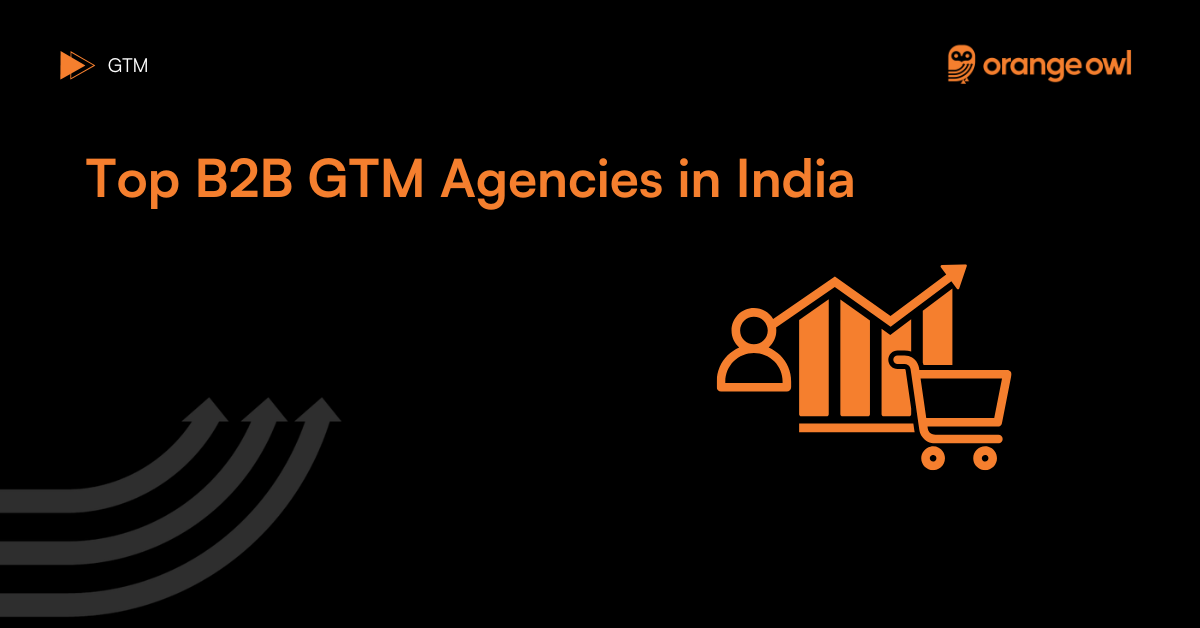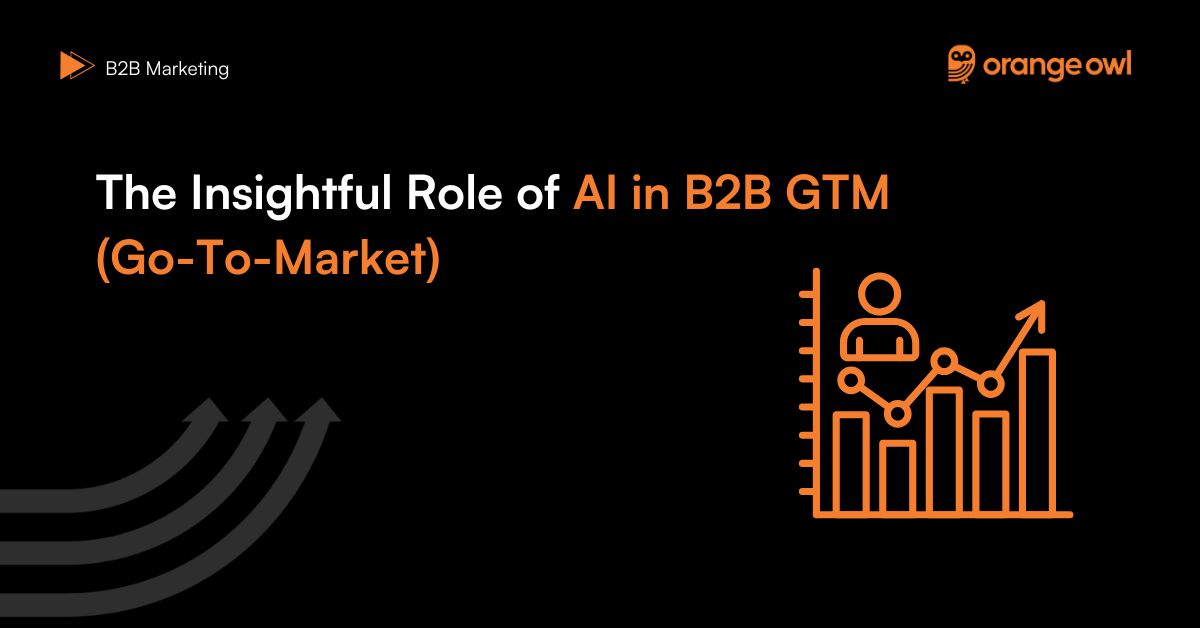Top 10 Generative AI Use Cases in B2B GTM Strategies
Vivek Goel
June 3, 2024

Table of Contents
In the rapidly evolving landscape of B2B marketing, generative AI is becoming a game-changer. From streamlining content creation to enhancing customer interactions, generative AI technologies offer powerful tools for companies looking to innovate their go-to-market (GTM) strategies. Here are ten transformative Generative AI Use Cases in B2B GTM Strategies, each providing distinct advantages to businesses seeking efficiency and competitive edge.
Top Generative AI Use Cases in B2B GTM
1. Automated Content Generation
Generative AI can produce high-quality, SEO-optimized content at scale. Whether it’s blog posts, whitepapers, case studies, or social media updates, AI tools can help B2B marketers create consistent and engaging content that drives lead generation and builds thought leadership.
Example: A B2B software company utilizes AI to generate weekly blog posts that address common industry challenges, explain product benefits, and share company news, significantly increasing its content output and SEO performance.
2. Personalized Email Marketing
AI can analyze customer data to create highly personalized email campaigns. By understanding patterns in customer behaviour and preferences, generative AI tools can customize email content that resonates with each recipient, increasing open rates and conversions.
Example: A B2B medical equipment supplier uses AI to analyze customer purchase histories and send personalized email recommendations for new supplies and equipment upgrades, leading to a 30% increase in repeat orders.
3. Dynamic Product Descriptions
For B2B companies with extensive product catalogues, one of the transformative Generative AI Use Cases in B2B GTM Strategies includes automatically generating detailed, tailored product descriptions based on audience segments and contexts. This application not only enhances efficiency but also ensures the relevancy of product communications.
Example: A B2B manufacturing firm employs AI to automatically generate unique product descriptions for their online catalogue, tailored to the different industries they serve, enhancing user experience and relevancy.
4. Chatbots for Customer Service and Engagement
AI-powered chatbots can handle customer inquiries 24/7, providing instant responses to common questions and freeing up human resources for more complex queries. These bots can guide customers through the buying process, improve engagement, and gather insights into customer preferences.
Example: A B2B logistics company implements a chatbot to handle customer inquiries about shipment statuses and booking details, reducing response times and increasing customer satisfaction rates.
5. Market Research and Insights Generation
Generative AI can quickly analyze vast amounts of data to provide insights into market trends, customer needs, and competitive dynamics. This capability allows B2B marketers to stay ahead of market shifts and refine their GTM strategies based on real-time data.
Example: A B2B financial services firm uses AI to analyze global financial trends and provide clients with up-to-date market insights, enhancing its reputation as a thought leader in the financial sector.

6. Sales Script Generation
AI tools can assist in creating effective sales scripts that are tailor-made for different stages of the customer journey. By analyzing past sales calls and outcomes, AI can suggest language and tactics more likely to convert prospects into customers.
Example: A B2B cloud services provider uses AI to create customized sales scripts that help salespeople address potential clients’ specific concerns and needs, improving the success rate of sales calls.
7. Automated Report and Proposal Creation
Generative AI can automate the creation of complex business reports, proposals, and RFP responses. This reduces manual efforts and allows sales teams to focus on strategy and customer interactions.
Example: A B2B marketing agency uses AI to generate end-of-month performance reports for clients, saving hours of manual work and allowing team members to focus on strategic activities.
8. Predictive Analytics for Lead Scoring
AI models can predict which leads will most likely convert, allowing sales teams to prioritize their efforts effectively. By analyzing historical data and engagement metrics, AI can score leads based on their potential value and likelihood of closing.
Example: A B2B software company implements AI-driven lead scoring to prioritize leads that show the highest potential for conversion based on engagement metrics, optimizing their sales efforts.
9. AI-Driven SEO Strategy
Generative AI can optimize your website and content for search engines by analyzing keywords, backlink opportunities, and content quality scores. This helps improve organic search visibility and drives more targeted traffic to your site.
Example: A B2B engineering firm uses AI to optimize its website content, including technical articles and case studies, ensuring high visibility in search engine results for niche industry terms.
10. Custom Training Modules for Sales Teams
AI can create personalized training programs for sales representatives based on their performance metrics and learning preferences. This helps in equipping them with the skills and knowledge required to effectively sell complex B2B products.
Example: A B2B healthcare solutions provider leverages AI to develop customized training modules for new sales hires, focusing on unique selling points of complex products to enhance their understanding and effectiveness.
Generative AI Bonus Use Case in GTM: Virtual Sales Assistants
AI-powered virtual assistants can help manage schedules, set reminders for follow-ups, and even suggest content for meetings based on the client’s history and preferences. This enhances the efficiency and effectiveness of sales teams.
Example: A B2B electronics distributor integrates a virtual AI assistant to help sales staff by providing real-time product information and inventory updates during customer calls, streamlining the sales process.
Conclusion
The integration of Generative AI Use Cases in B2B GTM Strategies offers significant advantages by automating and personalizing many aspects of marketing and sales. As these technologies continue to evolve, they will play a crucial role in shaping future marketing landscapes. B2B companies that adopt generative AI will not only streamline their operations but also provide more tailored, responsive, and effective customer experiences. Embracing AI is less about replacing human ingenuity and more about augmenting it to achieve superior results in complex markets.
Frequently Asked Questions (FAQs) about Generative AI Use Cases in B2B GTM Strategies
Generative AI refers to artificial intelligence algorithms that can generate content, whether it’s text, images, or even code, based on the training data they have been fed. This is different from other types of AI that might focus solely on analyzing data or automating processes. Generative AI is particularly useful for creating new content and providing insights that mimic human-like understanding.
Generative AI can dramatically enhance B2B content marketing by automating the creation of personalized content, optimizing SEO practices, and generating insightful data-driven reports and analyses. This leads to more targeted and effective content, better search engine rankings, and improved decision-making based on accurate analytics.
The cost of implementing generative AI can vary widely depending on the complexity of the tasks and the scale of deployment. However, many AI tools offer scalable pricing models, making them accessible even for smaller businesses. The initial investment can often be offset by the efficiencies and improvements in ROI these tools bring.
Absolutely! Generative AI can transform B2B sales strategies by generating personalized sales scripts, providing real-time customer insights, and automating follow-ups and lead scoring. This allows sales teams to focus on closing deals with prepared, tailored information that increases conversion probabilities.
While generative AI offers numerous benefits, it also comes with risks such as generating inaccurate or biased content if not properly supervised. Additionally, over-reliance on automated content can lead to a lack of personal touch, which is crucial in B2B relationships. It’s important to maintain a balance and ensure that AI tools are closely monitored and integrated with human oversight to maintain authenticity and accuracy.
Generative AI has advanced significantly and can handle complex content creation, including technical writing. However, it’s most effective when supervised by experts who can ensure that the content meets industry standards and is technically accurate. This combination allows businesses to produce high-quality, reliable content at scale.
Generative AI tools are designed to create unique content by learning from a vast dataset and generating new compositions based on that learning. However, it’s crucial for businesses to use plagiarism checkers and conduct manual reviews to ensure that all content is not only unique but also aligns with their brand voice and compliance requirements.
The complexity of the AI tool determines the steepness of the learning curve. Some user-friendly platforms are designed with intuitive interfaces that require minimal technical knowledge. However, maximizing the potential of more advanced AI tools may require training and a deeper understanding of AI principles. Companies often benefit from partnering with AI experts or investing in employee training programs.
Generative AI can significantly enhance customer engagement by personalizing interactions at scale, from customized email marketing campaigns to tailored product recommendations and dynamic content on websites. These personalized experiences make clients feel understood and valued, thereby increasing engagement and loyalty.
Measuring the ROI of generative AI involves tracking specific metrics that directly relate to the objectives it was employed to achieve. This could include increases in content output, improvements in lead generation and conversion rates, time saved in content production, and overall sales growth. Establishing clear benchmarks before implementation and using analytics tools to monitor these metrics will provide a comprehensive view of performance and ROI.


